How to install a pressure washer check valve kit

Pressure washer check valves let enough water flow through the pump and manifold to pressurize the water at the nozzle. If the pressure washer check valves are damaged, the pump won’t build pressure. Air in the inlet water supply can damage the pressure washer check valves, as can chemical residue left in the pump. Replace damaged check valves by installing a manufacturer-approved pressure washer check valve kit, following the steps in this repair guide.
Use this guide to install the pressure washer check valve kit in Craftsman, Generac, Briggs & Stratton, Snapper, Husqvarna and Troybilt pressure models.
Instructions
- 01.
Disconnect the spark plug
Disconnect the spark plug wire from the spark plug.
- 02.
Prepare the pressure washer for service
Remove the gas cap.
To prevent fuel from leaking from the tank, place a plastic bag over the mouth of the tank and then reinstall the gas cap.
Remove the inlet water hose and the outlet nozzle hose connection from the pump.
- 03.
Remove the caps from the manifold check valves
Use a wrench to remove the caps from the check valves on the side of the pump manifold.
Tip: Be prepared for water to spill from the manifold when you remove the check valve caps.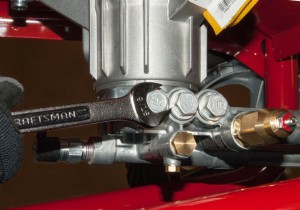
PHOTO: Loosen the manifold check valve caps.
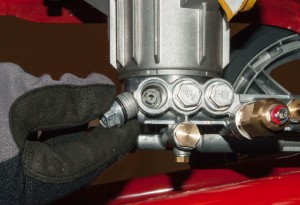
PHOTO: Remove the manifold check valve caps.
- 04.
Remove the manifold check valves
Insert a sheet metal screw into the plastic body of the check valve and screw it down so it grips the check valve body, and then pull the screw and check valve body out of the pump.
Use a mechanic’s pick to remove any residue left by the valve body or seals out of the pump body.
Repeat the process to remove all the check valves.
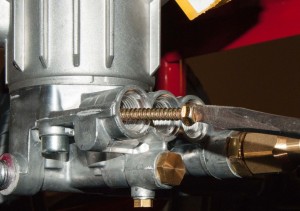
PHOTO: Insert a screw in the check valve body.
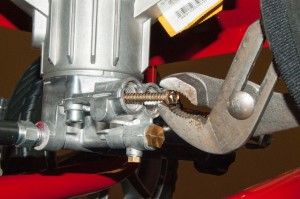
PHOTO: Pull the check valve out.
- 05.
Install the new manifold check valves
Insert the new check valves into the body of the pump.
Press the check valves down so that they seat properly.
- 06.
Reinstall the manifold check valve caps
Place a small amount of thread-locking adhesive on the check valve cap threads.
Reinstall the check valve caps and tighten them securely.
Tip: Ensure that the O-rings are in place and seat properly when reinstalling the check valve caps.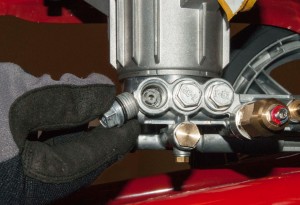
PHOTO: Reinstall the manifold check valve caps.
- 07.
Remove the pump manifold
If fluid is in the chemical injection tube, clamp the tube off.
Pull the chemical injection tube off the chemical injection inlet valve on the pump manifold.
Tip the pressure washer to access the bottom of the pump.
Remove the 3 Allen-head screws that secure the manifold to the pump.
Pull the manifold off of the pump.
Set the manifold down on a stable work surface.
Tip: Be prepared for some water to spill out of the manifold when removed.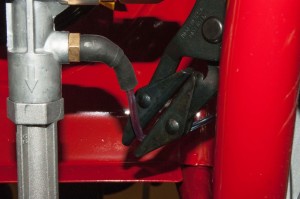
PHOTO: Clamp off the chemical injection hose.
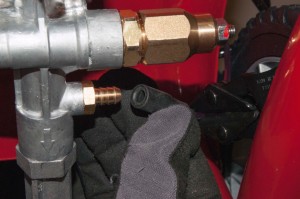
PHOTO: Pull the chemical injection hose off of the valve.
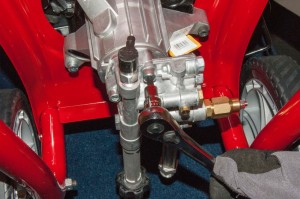
PHOTO: Remove the manifold screws.
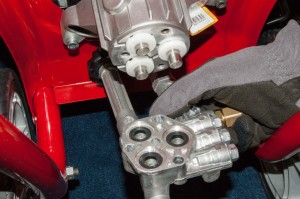
PHOTO: Remove the manifold from the pump.
- 08.
Remove the check valves
Remove the water seals from the top of the check valves.
Insert a sheet metal screw into the plastic body of the check valve and screw it down so that it grips the check valve body.
Pull the screw and check valve body out of the pump.
Use a mechanic’s pick to remove any residue left by the valve body or seals out of the pump body.
Repeat the process to remove all of the check valves.
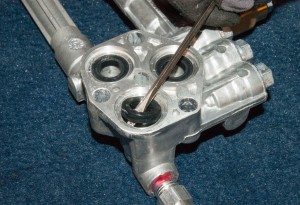
PHOTO: Remove the water seals.
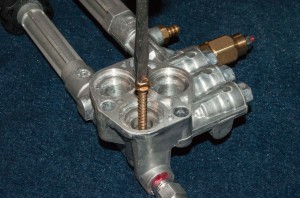
PHOTO: Insert a screw into the check valve body.
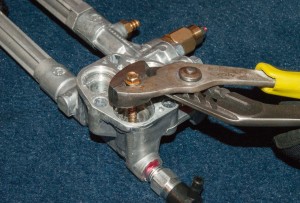
PHOTO: Remove the check valve from the pump.
- 09.
Install the new check valves
Insert the new check valves into the body of the pump.
Press the check valves down so that they seat properly.
Install the water seals at the top of the check valves.
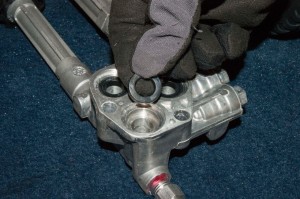
PHOTO: Install the water seals.
- 10.
Reinstall the pump manifold
Position the manifold on the pump and replace the mounting screws.
Tilt the pressure washer upright.
Reinstall the chemical injection tube on the chemical injection inlet valve on the manifold. Remove the clamp from the chemical injection tube.
Tip: If you have a torque wrench, torque the screws to 18 to 20 ft. lbs. of torque.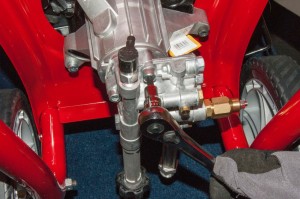
PHOTO: Reinstall the manifold mounting screws.
- 11.
Restore the pressure washer to its operating condition
Remove the gas cap, the plastic bag from the mouth of the gas tank and reinstall the gas cap.
Reattach the spark plug wire.
- 12.
Test the pressure washer operation
Run the pressure washer and check for leaks. Check for proper pressure at the nozzle.
Symptoms for gas pressure washers
Choose a symptom to see related pressure washer repairs.
Main causes: using a high-pressure spray tip when applying detergent, clogged siphon tube, chemical injection system fai…
Main causes: overfilling engine with oil, improper fuel/air mixture, choke system problems, dirty carburetor, engine nee…
Main causes: broken recoil spring, damaged recoil starter…
Main causes: dirty air filter, stale fuel, clogged or dirty carburetor, bad unloader valve…
Main causes: insufficient water supply, clogged water inlet screen, clogged pressure hose, faulty pump check valves, stu…
Main causes: damaged recoil starter, oil inside cylinder, locked up engine piston…
Main causes: faulty unloader valve, bad pressure regulator…
Main causes: stale fuel, gummed up carburetor, engine needs tune up, throttle and choke controls need adjustment, bad re…
Main causes: pump running for more than 5 minutes when the spray wand isn't being used, faulty pressure relief valve, ba…
Repair guides for gas pressure washers
These step-by-step repair guides will help you safely fix what’s broken on your pressure washer.
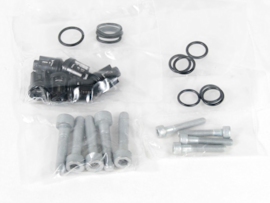
How to install a pressure washer check valve kit
Air in the inlet water supply can damage the check valves. If the pump won’t build up pressure due to damaged check valv…
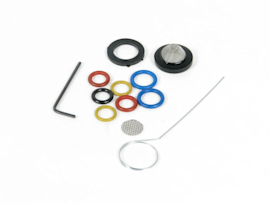
How to install a pressure washer O-ring kit
O-rings seal fittings on the pressure washer pump. Damaged seals allow water to leak from the pump. Follow these steps t…
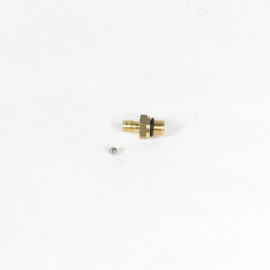
How to install a pressure washer chemical injection kit
The chemical injection valve draws detergent into the pump. If it’s not drawing detergent, use a repair kit to replace t…
Effective articles & videos to help repair your pressure washers
Use the advice and tips in these articles and videos to get the most out of your pressure washer.

Learn about all the convenient features on our Sears PartsDirect website that make your parts purchases easier.…

Learn about a new feature added to the Search Bar on Sears PartsDirect…
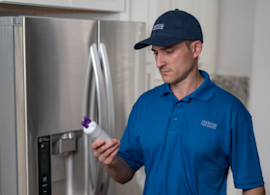
Get answers to frequently asked questions about Sears and Sears PartsDirect.…